Welcome back to This Week in Apps, the Extra Crunch series that recaps the latest OS news, the applications they support and the money that flows through it all.
The app industry saw a record 204 billion downloads and $120 billion in consumer spending in 2019, according to App Annie’s “State of Mobile” annual report. People are now spending 3 hours and 40 minutes per day using apps, rivaling TV. Apps aren’t just a way to pass idle hours — they’re a big business. In 2019, mobile-first companies had a combined $544 billion valuation, 6.5x higher than those without a mobile focus.
In this Extra Crunch series, we help you keep up with the latest news from the world of apps, delivered on a weekly basis.
This week, we’re continuing our special coverage of how the COVID-19 outbreak is impacting apps and the wider mobile app industry — or rather, the boost many apps are receiving as a result. In fact, the first quarter saw consumer spending hit record levels in Q1 as everyone was staying indoors. But as some apps shoot up the charts, scrutiny over their practices increases. This week saw No. 1 app Zoom defending itself against a host of complaints over security issues, for example, while social video app Houseparty defended itself against a possible smear campaign. There’s also a new app from the Pinterest CEO for tracking the spread of COVID-19.
Also this week: more leaks about the new version of iOS, Apple bought Dark Sky, Niantic pivoted, TikTok moved up the charts and more.
Coronavirus/COVID-19 special coverage
Pinterest CEO, scientists team up on COVID-19 tracking app
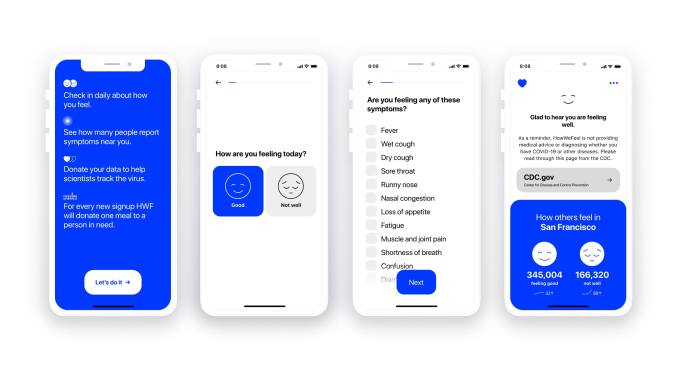
Since the government isn’t bothering! Pinterest co-founder and CEO Ben Silbermann, a team from Pinterest and CRISPR gene-editing pioneer/MIT and Harvard Broad Institute member Dr. Feng Zhang teamed up to develop an app that tracks the spread of COVID-19 across the U.S. The app, called How We Feel, was built with input from a number of well-regarded public health, computer science, therapeutics, social science and medical professors from Harvard, Stanford, MIT, Weill Cornell and more. The app doesn’t ask for personal information like name, address, email or phone — just a location and symptoms. The aggregated data, if it scales, could help researchers better understand the disease’s spread.
Record app spending in Q1 as everyone stays indoors
People stuck at home due to the coronavirus outbreak have been turning to apps to do their shopping, manage their finances, find new exercises, work from home and stay entertained. According to App Annie, Q1 2020 was the largest-ever quarter in terms of consumer spend on apps. In the quarter, consumers worldwide spent more than $23.4 billion through app stores. In addition, the average weekly time spent in apps and games worldwide was up 20% year-over-year in the quarter, based on an analysis of Android devices.
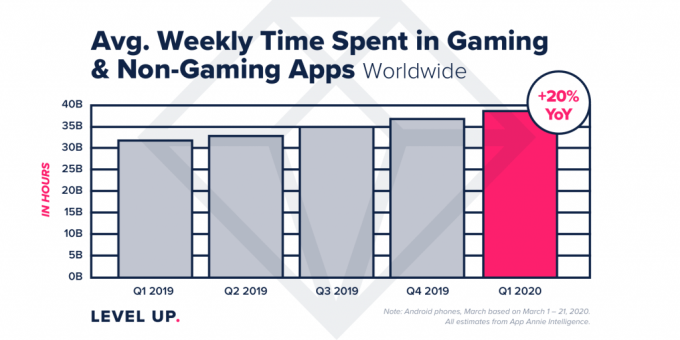
Consumers also downloaded 31 billion new app downloads in Q1 2020, up 15% from the fourth quarter of 2019. That’s notable, given that the fourth quarter usually sees a big jump of app installs from holiday sales of new phones, and Q1 managed to top that. Non-gaming apps were downloaded more than games on both iOS and Android, as people looked to apps for work, educational activities, entertainment, groceries and more. However, more money was spent on games.
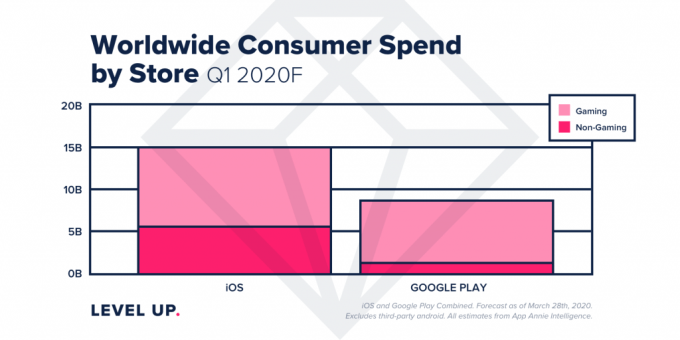
Google restricts YouTube for Android to 480p in India during outbreak
Due to the spread of coronavirus, global internet usage is on the rise. Video traffic, like that from Netflix and YouTube, can eat up a lot of bandwidth needed for more critical information, so YouTube said it would set the default for 480p on Android, but XDA Developers found that it was actually being restricted to 480p for some in India — on Wi-Fi and cellular alike.
YouTube isn’t the only one restricting video quality. Netflix, Disney+ and Amazon Prime Video have done the same in various countries, and WhatsApp is now restricting video status updates to 15 seconds in India, too.
Videoconferencing apps saw a record 62M downloads during one week in March
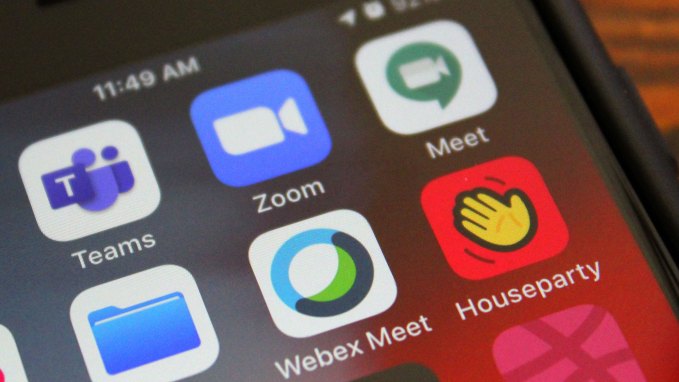
Work-from-home policies, social distancing and government lockdowns increased the demand for video conferencing apps for both business and personal use. According to a report from App Annie, business conferencing apps have been experiencing record growth and just hit their biggest week ever in March, when they topped 62 million downloads during the week of March 14-21. That’s up 45% week-over-week, and an increase of 90% from the weekly average of business app downloads in 2019.
Social networking video app Houseparty has also seen phenomenal growth in Europe during lockdowns and home quarantines. Another report noted it was the No. 1 iOS app in Australia, Canada and the U.K. as a result of the lockdowns.
Houseparty wasn’t hacked, it was smeared?
Houseparty’s usage has spiked from the coronavirus outbreak, as it allows friends to stay in touch through its fun video chat app. But something odd has been happening. A number of British tabloids ran stories on Monday citing social media complaints where people claimed their accounts were hacked. Houseparty responded that it had not been hacked or compromised in any way. The company later said it believed the complaints were a part of a “commercial smear campaign” intended to harm its app. It’s offering a million-dollar reward to anyone who can prove it.
Houseparty may not have been hacked, but it’s not the most secure. In a personal example, it allowed someone using my email address to set up an account. Clearly it doesn’t verify emails, much less require 2FA. I was able to reset the password in order to claim the account associated with my email, but my support request for an account deletion hasn’t been answered after a day’s time. The app also has a worrisome privacy policy.
Niantic pivots to indoor gaming
Niantic, the development company behind popular AR mobile games Pokémon GO and Harry Potter: Wizards Unite, is adapting its titles to support at-home gaming in response to the COVID-19 pandemic. Typically, Niantic’s games encouraged people to go outdoors, explore their world and connect with others in-person as they played. But with government lockdowns and home quarantines underway, it’s no longer safe to play these games as originally intended.
The company says it will now prioritize making changes to its AR titles to allow people to play inside and around their own homes.
Zoom apologizes, promises to do better on security

Image Credits: Bryce Durbin/TechCrunch
Video conferencing app Zoom has become a No. 1 app, but the company recently came under fire for a host of privacy issues, and even drew scrutiny from the NY Attorney General and the FBI. Security experts pointed to its false claims about encryption, and the company is now facing class-action lawsuits over a feature that shared user data with Facebook. (Zoom has since deactivated this feature.)
Zoom founder and CEO Eric Yuan took to the company blog to apologize this week.
“We recognize that we have fallen short of the community’s — and our own — privacy and security expectations. For that, I am deeply sorry, and I want to share what we are doing about it,” he said.
He noted that Zoom’s growth ballooned overnight. In December, it saw approximately 10 million daily meeting participants. By March, that figure was 200 million. He also pointed out that companies large and small were using the app after doing their own security reviews. But Zoom had never foreseen a situation where it was going to be used by so many, including consumers.
The company says for the next 90 days, all work on features is being frozen so all Zoom’s engineering resources will focus on fixing security issues. It will also conduct a review of its app with third-party experts, prepare a transparency report, enhance its bug bounty program, launch a CISO council, engage in white box penetration tests and host a weekly webinar on security updates.
While it would have been better to have built with security in mind from the beginning, this seemed like a promising reply. But on Friday, Zoom shared a blog post indicating the app had more troubles — it had routed some calls through China by mistake. The error was due to Zoom trying to expand to accommodate more users, it said. Government users weren’t impacted, but it’s not clear how many were.
Headlines
Apple buys Dark Sky

Apple acquired Dark Sky, home not only to the Dark Sky weather app but also an API that powered several weather apps on the App Store. Apple could easily use Dark Sky to upgrade its fairly boring Weather app with more data, like radar or precipitation information, making it a more viable competitor to third-party weather apps on the market.
But it could also transition Dark Sky’s developer customers from the Dark Sky API, which will be shut down in 2021, over to its own managed API instead. That would give Apple more control over the App Store, but it could also make available new or specific features to developers to use in their non-weather apps as well, like running apps or calendar apps that would alert you to rain and ski-trip planners that would report snowfall conditions.
TikTok was the most-downloaded app in the world in Q1
TikTok is continuing to dominate the charts, App Annie’s newly released Q1 2020 analysis found. The app is still the most-downloaded worldwide ahead of WhatsApp, Facebook, Instagram and Messenger, at No. 2, 3, 4 and 5, respectively. But perhaps more importantly is the fact that TikTok is now finding its way onto the top-grossing chart as well.
In Q1, the app climbed two positions to reach the No. 6 spot — ahead of Disney+, Google One, Pandora and LINE Manga. That indicates TikTok is finding a way to monetize its sizable user base.
TikTok today makes money through a combination of advertising and in-app purchases. Revenue in Q4 2019 was up over 300%. However, last year’s total revenue only came in at $176.9 million — a drop in the bucket compared to what Facebook brings in. TikTok is challenged because it doesn’t have as much personal information about its users, compared with Facebook’s rich user profile data. That means advertisers can’t target TikTok ads based on user interests and demographics in the same way. Because of this, brands will sometimes forgo working with TikTok itself to deal directly with its influencer stars instead.
YouTube to take on TikTok with “Shorts?”
Still, TikTok remains the one to beat — and apparently, YouTube wants to try. Google’s video platform is reportedly considering a TikTok rival involving a “feed of brief videos” in The Information’s light-on-the-details report. It may tap into YouTube Music’s catalog, as well. Remember, however, that YouTube already has a short-form video platform with YouTube Stories. It’s not clear how this will be impacted by any TikTok competitor.
Apple accidentally confirms AirTags
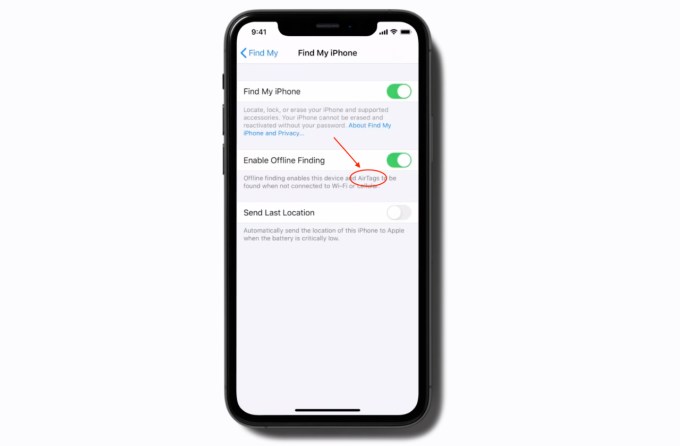
Whoops! Apple accidentally revealed the existence of an unreleased product, AirTags, in a support video uploaded to its YouTube account on Thursday. The video, “How to erase your iPhone,” was offering a tutorial about resetting an iPhone to factory settings. At one point, it instructs users to turn off “Find my iPhone” as part of the process. On the Settings page that then appears, another option for “Enable Offline Finding” is shown, and beneath that, the text references AirTags by name.
Specifically, it said: “Offline finding enables this device and AirTags to be found when not connected to WiFi or cellular.”
AirTags, of course, had been rumored and spotted in the iOS code, but not formally announced. But they’re an open secret. Tile, which makes a Bluetooth tracker that will compete with AirTags, has been arguing to Congress that Apple is behaving in anti-competitive ways, as AirTags will be integrated into Apple’s “Find My” app. Tile and other Bluetooth trackers won’t be able to do the same. Tile also has to ask for background location access repeatedly, while Apple’s AirTags will not. That sets up an uneven playing field.
Apple removed the video from YouTube and didn’t respond to requests for comment. You can watch a downloaded version of the video here.
Apple customers can now buy and rent in Prime Video
![]()
A recent update from Amazon has made it easier for Apple customers to buy or rent movies from its Prime Video app. Before, customers using the Prime Video app from an iOS device or Apple TV would have to first purchase or rent the movie elsewhere — like through the Amazon website or a Prime Video app on another device, such as the Fire TV, Roku or an Android device. Now, Prime Video users can make the purchase directly through the app using their stored Amazon payment credentials.
In a statement, Apple said that Amazon joined an existing program to make this change possible. But no one had heard of the program until now — and it’s only offered for subscription services with a card on file that also include a rental/purchase catalog. Like, Canal+, Altice One or Prime Video. Or, you know, the Apple TV app where Apple TV+ now streams.
John Gruber also later discovered that non-Prime subscribers could make their purchases and rentals too, but instead of going through Amazon’s system for those transactions, they’d function as an in-app purchase that goes through Apple Pay. Seems like everyone wins here.
Mobile app spending to double by 2024 despite COVID-19
According to a revised 2020-2024 market forecast from app intelligence firm Sensor Tower, a sizable increase in app downloads for industries like remote work and education will lead to a large surge in app installs for the early part of 2020 and beyond, despite other decreases in downloads for ride-hailing and fast-food apps. However, the expected economic downturn will somewhat dampen revenue growth in the years ahead, the report found. However, mobile app spending worldwide will continue to grow and will even double by 2024.
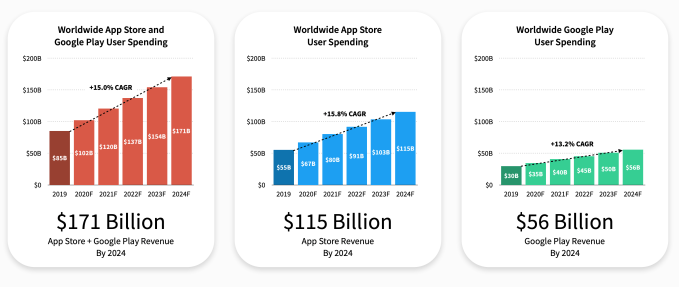
Worldwide consumer spending in mobile apps is projected to reach $171 billion by 2024, more than double the $85 billion from 2019. This total, however, is about $3 billion (or 2%) less than the forecast the firm had released prior to the outbreak.
More iOS 14 leaks: iCloud Keychain password manager takes on 1Password
Add a new password manager to the growing list of iOS 14 leaks. By digging in the code again, 9to5Mac found evidence of an improved iCloud Keychain password manager for iOS, which includes two-factor password integration and other changes. The new manager will warn about reused passwords and introduce a new method for saving two-factor authentication passwords, the report claims.
Google shuts down Neighbourly app
At a time when people need more than ever to connect with their friends and communities online, Google has shut down its local communities app, Neighbourly, designed for the Indian market. The app never gained enough traction, apparently, according to an email sent by Google. The app was only downloaded 5,000 times in February, but had over 10 million total installs to date, according to Google Play. The app will close up on May 12, but users will have an additional six months to retrieve data.
Snapchat Stories arrive in other apps
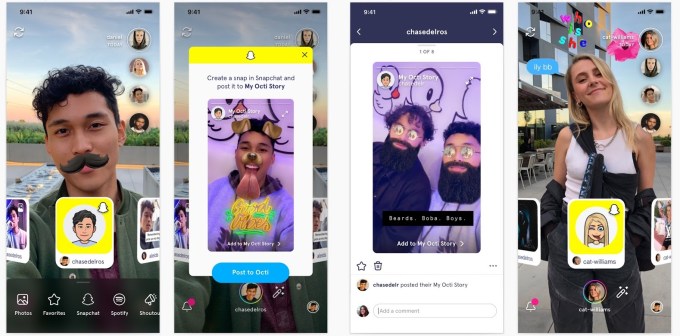
Everyone’s doing Stories now, thanks to Snapchat. The social networking app’s new plan to maintain its grip on the format it helped popularize is the launch of Snapchat App Stories. This allows users to share their story not only within Spotify, but also to Stories on other platforms integrated with Snap Kit. For partners, that means an influx of free content to build up their own social networks as well as more premium stories than their own tools could create. At launch, the feature works in apps like Hily, Triller and Squad.
App Store Connect adds new financial report
Starting in April, developers will be able to get more details about the proceeds of their apps and in-app purchases, including the transaction and settlement dates for purchases, as well as the states or Canadian provinces for transactions. This will be available through a new “All Countries or Regions (Detailed)” report in App Store Connect, Apple says.
HQ Trivia rises from the dead
But is a dead man walking at this point? After an absolutely nuts final episode with drunk, cursing hosts and out of control hosts, Trivia HQ closed up shop due to lack of funds. CEO and co-founder Rus Yusupov claimed it was going to be acquired, but the acquisition had fallen through. (The app earlier this year was in talks to sell to Whistle for $20 million). This week, it unexpectedly returned with a new show — apparently, a new investor has been working to restart operations. Now is as good a time as any for a live trivia app to try again, given the captive audience stuck at home. But consumer interest may have faded, as the app never lived up to the hype as it faced rampant cheating, smaller jackpots and prize money delays.
Game-streaming apps have a record March
Live-streaming apps associated with gaming also had a record month, reports Apptopia. Twitch, Mixer and Caffeine (and Discord, an app favored by gamers), set new revenue records in March. Caffeine was the smallest of the lot, with about $3,000 in consumer spending in its app, and Twitch was the largest at $8.2 million. Microsoft’s Mixer pulled in $360,000 and Discord $890,000.
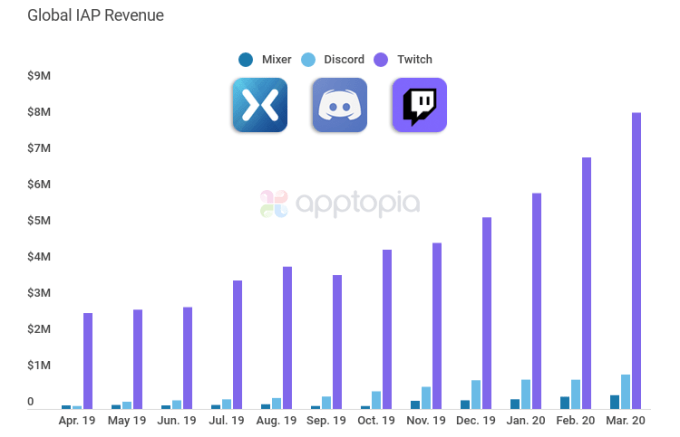
Discord and Caffeine saw record downloads, too, at 10.4 million and 674,000, respectively. Plus, users spent more time in the apps this March. Discord’s time spent in-app was up 27.5% this March, compared with March 2019, while Twitch was up 36.5%, the firm found.
M&A and Funding
- Apple acquired Dark Sky, maker of a weather app that includes precipitation and radar, as well as the maker of an API used by the weather app industry. The API shuts down in 2021. Hopefully, Apple will offer its own later on.
- Niantic acquired AR startup 6D.ai, which built software that let smartphone cameras detect the 3D layouts of spaces around them. The acquisition size was not detailed.
- Dining and takeout startup Allset raised $8.2 million as life under lockdown continues. The company started by offering a quick in-restaurant dining experience for people on lunch breaks, for example, but has now expanded to contactless takeout options. It may offer delivery later on, via a partner.
- Nordic challenger banking app Lunar raised €20 million in Series B funding to grow its mobile-only banking app business.
Downloads to ease your boredom
HBO NOW or HBO GO — even if you don’t subscribe, there’s now a lot of free content to stream. To help customers stuck at home (and to gain traction ahead of the launch of HBO MAX, let’s be real), HBO is offering a slate of great TV and movies for free, including “The Sopranos,” “The Wire,” “Veep,” “Six Feet Under,” “Pokémon Detective Pikachu,” “Crazy, Stupid, Love” “Empire of the Sun,” “McMillion$” and “The Case Against Adnan Syed,” and others.
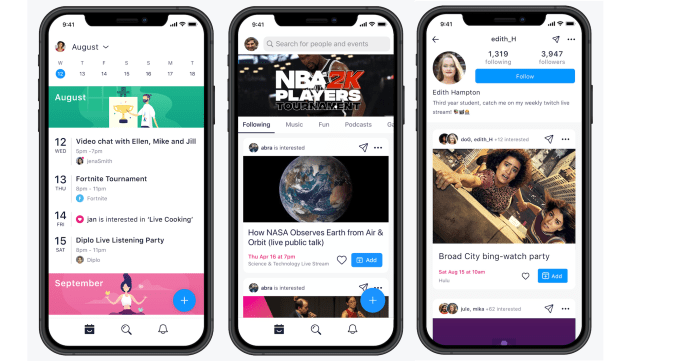
IRL — a fun event directory had to pivot in light of the COVID-19 crisis. The new app (where the “R” stands for “Remote” instead of “Real”) now focuses on helping people find, RSVP for, plan, share and chat about virtual events, like live-streamed concerts, esports tournaments and Zoom cocktail parties.
King games — Candy Crush and its various sagas, and others made by King, are being updated with free lives so you don’t have to wait to progress. Typically, users would either ask friends or make an in-app purchase to skip the delay. But as a part of the #PlayApartTogether campaign, a number of games are adding COVID-19 messages and, in King’s case, make gaming less frustrating. Supported titles include: Candy Crush Saga, Candy Crush Soda Saga, Candy Crush Jelly Saga, Candy Crush Friends Saga, Farm Heroes Saga, Bubble Witch 3 Saga and Pet Rescue Saga.
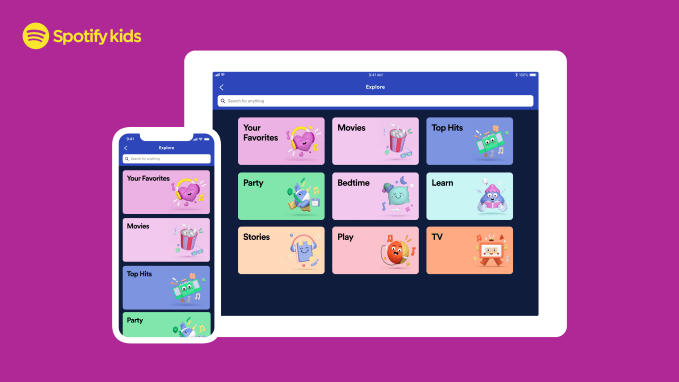
Spotify Kids — Spotify’s family-friendly, kid-safe standalone app, Spotify Kids, has launched in the U.S., Canada and France. (It’s already live in Sweden, Denmark, Australia, New Zealand, the U.K., Mexico, Argentina and Brazil.) Put it on your iPad, attach some headphones to young ears, then stream some Disney tunes. And grab yourself a moment of peace!


